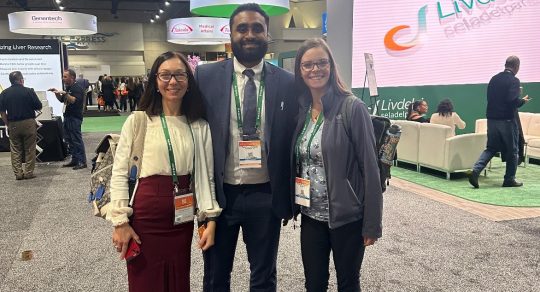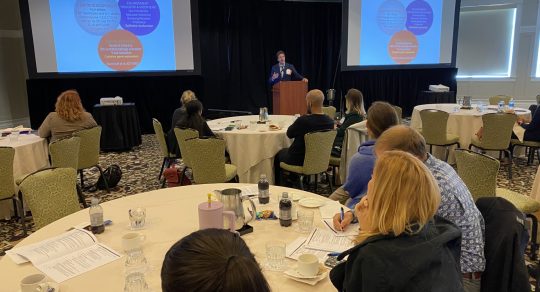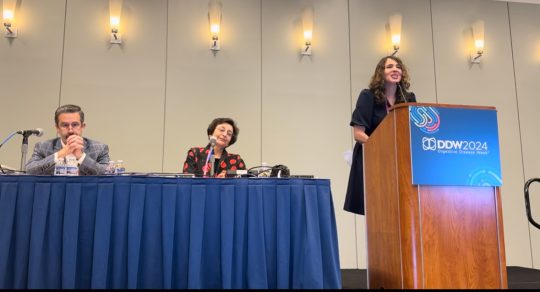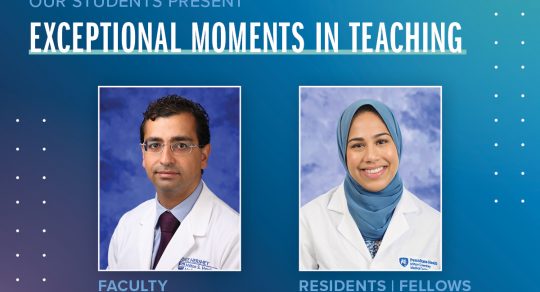Programs
Gastroenterology and Hepatology Fellowship
The Gastroenterology and Hepatology Fellowship at Penn State Health Milton S. Hershey Medical Center is a three-year, ACGME-accredited program that admits three fellows per year.
Explore More
The goal of the Gastroenterology and Hepatology Fellowship is to equip fellows with the appropriate skills to allow them to excel in a career path of their choice. The program is designed to provide training in patient management, procedural skills, teaching and research. A strong clinical experience, managing both inpatients and outpatients with gastrointestinal and liver disorders, is provided.

Program Overview
There is also an opportunity to enroll in the Department of Public Health Sciences graduate programs. Recent GI fellows have successfully completed MS degrees during their GI fellowship period.
The program follows the Gastroenterology Core Curriculum in the training of gastroenterology fellows, in preparation to sit for the ABIM Board Examination in Gastroenterology. These training guidelines have been recommended by the American Gastroenterological Association, American Association for the Study of Liver Diseases, American College of Gastroenterology and American Society for Gastrointestinal Endoscopy.
Topics covered include:
Endoscopy
Dedicated rotations in the endoscopy suite.
Competence in general endoscopy with exposure to therapeutic endoscopy
Liver biopsies
Esophageal and anorectal manometry
GI Consultant Service
Rotation on GI Consultant Service throughout the three-year program
Motility and General Gastroenterology
One of 10 centers recognized nationally as a Gastrointestinal Motility Center of Excellence
Fellows spend at least one month a year rotating on a motility elective with training on reading motility studies and participation in outpatient motility clinics
Inflammatory Bowel Diseases (IBD)
Dedicated IBD center where GI and colorectal surgery see patients together
All fellows spend at least one month a year rotating on an IBD elective
Fellows perform chromoendoscopy and see patients in IBD clinic
In addition to these clinical activities, fellows are involved in research and journal club conferences, which are aimed at providing a core of knowledge in pathophysiology and critical literature review.
Fellows will be involved in teaching the medical students and residents rotating on the service. A significant research experience will be provided during the second year of training. The third year is individually tailored to the career goals of the fellow and includes advanced therapeutic endoscopic techniques.
Learn More about the Fellowship
General Application Information
Applications are only accepted through ERAS in accordance to the NRMP Specialties Matching Service policies and schedules.
Application Requirements
Three letters of recommendation
Passing scores on all USMLE steps or on all COMLEX levels
Learn more about the process of applying for a gastroenterology and hepatology fellowship in this 2012 article from Gastroenterology.
Interview Details
The program interviews on Wednesdays in late September through early November. Those selected to interview will be contacted directly.
Leadership

Professor and Margot E. Walrath Career Development Professor, Medicine

Professor and Vice Chair for Clinical Affairs, Medicine

Assistant Professor, Medicine
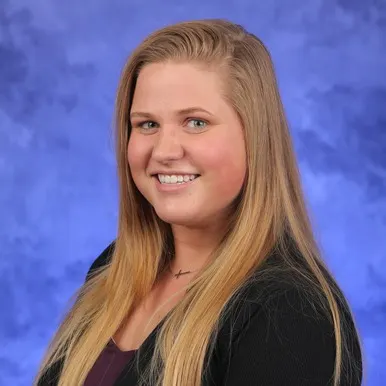
Program Coordinator, Gastroenterology and Hepatology Fellowship, Nephrology Fellowship and Rheumatology Fellowship, Medicine
Supporting Your Training
Curriculum Details
The first year of the fellowship involves intensive clinical training with emphasis on the pathophysiological approach to diagnosis and management of a broad spectrum of GI and liver diseases.
Consultative GI Service
The first-year fellow is responsible for the management of a busy Gastroenterology Consultative Service. More than 800 consults per year provide a broad base of clinical experience. The consultative gastroenterology team consists of an attending, a fellow, a rotating medicine resident and one or two medical students. Daily teaching rounds are conducted seven days a week.
Endoscopy Rotation
During these dedicated endoscopy rotations, the fellows are taught the cognitive and procedural skills in diagnostic endoscopy, including upper endoscopy and colonoscopy. Upper endoscopic procedures include esophageal dilatation, pneumatic dilatation, percutaneous gastrostomy tube placements, small bowel biopsy, and therapeutic modalities to control upper gastrointestinal bleeding including bicap, heater probe and injection therapy. Liver biopsies, along with injection sclerotherapy and banding of varices and placement of Sengstaken Blakemore tubes in the treatment of bleeding esophageal varices, are taught in the management of patients with liver disease. Lower gastrointestinal endoscopic procedures include flexible sigmoidoscopy and colonoscopy with polypectomy.
Hepatology
For two to three months, the first year-year fellow is assigned to the Hepatology Program.
Outpatient Continuity Clinic
Half-day clinics provide a broad experience in the management of patients in the outpatient setting.
IBD Rotation
Fellows will spend one month on a dedicated IBD rotation.
Motility and General Gastroenterology Rotation
Fellows will spend one month on a dedicated motility rotation.
Research
Fellows will work with a research mentor to start to develop projects.
ASGE Endoscopy Education
First-year fellows will attend a weekend of structured endoscopy education in Chicago, usually within their first 60 days of fellowship.
The second year of the fellowship provides training in more advanced procedural skills and an introduction to research.
Endoscopy Rotation
The procedures that are performed by the second-year fellow include more colonoscopy training, diagnostic ERCP and treatment of malignant strictures by YAG laser and further fine-tuning of the stated skills learned in the first year.
Transplant Hepatology
For two to three months, the second-year fellow is assigned to the Liver Service. This service includes attendance at the weekly Liver Transplant Clinic, where prospective patients with liver diseases are managed.
Research
The fellows are exposed to clinical or basic science research during the second year through months of protected time during which the fellows are not involved in clinical activities other than outpatient clinic one half-day per week and a half day of endoscopy. It is expected that fellows will submit an abstract to the national meetings of the American Gastroenterological Association, the American Society for Gastrointestinal Endoscopy, the American College of Gastroenterology or the American Association of Liver Diseases.
IBD Rotation
Fellows will spend one month on a dedicated IBD rotation.
Motility and General Gastroenterology Rotation
Fellows will spend one month on a dedicated motility rotation.
Consultative GI Service
Second-year fellows will also participate for a few weeks on this service.
The structure of the third year is designed to enable fellows to become competitive in their career paths. For those fellows interested in pursuing an academic career path, the third year will be designed to enhance their basic science or clinical research experience and to enable them to achieve funding for additional training, if necessary, as well as providing the clinical experience to develop expertise in a specific clinical area.
Endoscopy Rotation
Third-year fellows are involved in therapeutic ERCP, including sphincterotomy, stone extraction and stent placement in the biliary and pancreatic ducts. Exposure to endoscopic ultrasound is available. In addition, fellows will continue to enhance their skills at EGD and colonoscopies.
Research
There will be dedicated research time given during the third year as well.
IBD Rotation
Fellows will spend one month on a dedicated IBD rotation.
Motility and General Gastroenterology Rotation
Fellows will spend one month on a dedicated motility rotation.
Transplant Hepatology
For one to two months, the third-year fellow is assigned to the Liver Service. This service includes attendance at the weekly Liver Transplant Clinic, where prospective patients with liver diseases are managed.
Consultative GI Service
Third-year fellows will also participate for a few weeks on this service.
The fourth year is an advanced endoscopy fellowship focusing on therapeutic endoscopic procedures, such as ERCP, EMR, luminal steering and treatments for Barrett's esophagus. This is an optional, non-ACGME-accredited year.
Night and weekend call are shared by all fellows.
Fellows are encouraged to develop a fellowship in line with their interests. For example, a fellow could do an elective in radiology or pediatric gastroenterology.
In addition to the outpatient and inpatient clinical experience, there are a number of formal and informal teaching conferences within the division. Fellows are extensively involved in all these conferences.
In addition to the in-house conferences, the Division of Gastroenterology and Hepatology is active in the Central Pennsylvania Gut Club.
Fellows attend the annual meeting of the major gastroenterology or liver societies. Those who have research-based abstracts accepted for presentation will be able to attend additional conferences.
The weekly and monthly conferences include:
Clinical Case Conference
Journal Club
Research Conference
Morbidity and Mortality Conference
Liver/Pancreas/Foregut Conference
Medicine Grand Rounds
GI and Hepatology Pathophysiology Conferences
IBD Multidisciplinary Conference
Endoscopic Video Series
IBD Multicenter Conference
Interventional Endoscopy Conference
Monthly meeting with the fellows and Program Director
IBD Clinical Conference
Motility Interest Group
Liver Tumor Conference
Fellow Honors and Recognitions
Penn State College of Medicine and Penn State Health Milton S. Hershey Medical Center accept ongoing nominations for the Exceptional Moments in Teaching award.
The award, given monthly by the Office for a Respectful Learning Environment, accepts nominations from College of Medicine students who are invited to submit narratives about faculty members, residents, fellows, nurses or any other educators who challenge them and provide an exceptional learning experience. See more about the award here.
Previous nominees from the Gastroenterology and Hepatology Fellowship are listed here.
Previous oral and poster presentations from the Gastroenterology and Hepatology Fellowship are listed here.
The annual Resident/Fellow Research Day is held each year (with exception of during the COVID-19 pandemic) on and around the Penn State Health Milton S. Hershey Medical Center campus.
The intent of the event is to provide an opportunity for residents and fellows to showcase their research accomplishments to their peers in other clinical departments, as well as their colleagues in the basic sciences.
Learn more about Resident/Fellow Research Day here.
Previous presentations from the Gastroenterology and Hepatology Fellowship are listed here.
